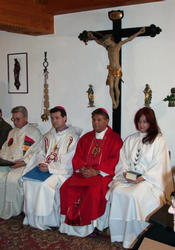|
|
|
Christian - Catholic - Charismatic - Progressive - Ecumenical
ChristianAt the Church of Jesus the King we hold ourselves to be fully Christian and fully Catholic, maintaining the Seven Catholic Sacraments and the Apostolic Succession of our clergy members. This characteristic of the churches broadly described as Catholic - or better Episcopal, ie having Bishops - effectively means that the Bishops ordain the clergy in a "family tree" traced back to the Holy Apostles. Christian because we believe in the promise of Jesus, and that he, the living word, the Gospel (a message of news, not a book) is among us.
CatholicThe Church is considered Catholic also in the sense that its members believe in God's ongoing invitation to Christian conversion, made to all people, and the efficacy of the Sacramental life in responding to this call. We understand that for many people part of their Catholic identity entails a loving devotion to the Pope, and active submission to the See of Rome. Respecting that, we do point out that the words Catholic and Roman are not synonymous but complimentary. You can indeed be Catholic without being a follower of the Pope.
|
|
|
Traditionalist?
Listen to what Eamon Duffy writes: "'Tradition' has become a fraught and difficult term, invoked by self-styled 'traditionalists', to call a halt to change and herald a return to the forms and mindset of the recent past, rather than as a resource for change." We recognise our calling to practice tradition in the following phrase: "an understanding of the richness of the Church's past is a liberation, not a straightjacket." (Eamon Duffy quoted from the Preface to Faith of our Fathers, Continuum, 2004)
|
|
|
CharismaticThe Church of Jesus the King is considered Charismatic because its members emphasise the role and work of the Holy Spirit in bringing people to awareness of God's call to unity in Jesus Christ. The influence of the Charismatic movement is present in liturgy and prayer style, but not in other elements of popular "Charismatic theology" such as "Baptism in the Holy Spirit."
ProgressiveAlso, as the Spirit’s mysterious work proceeds without hindrance and without discrimination, the Church of Jesus the King believes, both men and women, married or not, can be called to serve in all levels and offices of the ministry and priesthood, as can people of alternative gender identity and lifestyle choices.
|
 |
EcumenicalThe Church of Jesus the King maintains an active commitment to macro–ecumenism, fostering relationships with all types of faith and religious groups, Christian and non-Christian. There is open cooperation and co-celebration with other small churches and missionary congregations, and there have been moves towards communion with the Episcopal Churches in Europe. There is a special interest in the beliefs of the indigenous peoples of Latin America because our Church's founder, Archbishop Romulo Antonio Braschi, has lived and worked among various Latin American peoples. While stopping short of pantheism or theological pluralism, the Church believes that "essential truths" are deposited by God in all sincere and life–affirming religions and cultures, and that since human beings and their knowledge are, by nature, incomplete and flawed, it is nonsense to talk about superiority and inferiority or gradations of value and truth in comparative religion. All human–held belief systems, by virtue of being human–held, must therefore be partially reflective of truth (i.e. of God) and partially reflective of limitations (i.e. of people).
|
|
|


